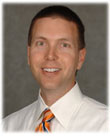 by John Steinberg, DPM
by John Steinberg, DPM
PRESENT Editor
Assistant Professor,
Department of Plastic Surgery
Georgetown University
School of Medicine |
Everything Just Seems to Fall Into Place...
I graduated from residency in 1998. Since that was over a decade ago, I guess I can automatically qualify myself as an expert in residency education...or at least someone who is getting old and no longer a "Young Practitioner". I very distinctly remember my greatest residency anxiety/fear: as a first year resident watching my senior residents do major reconstruction and trauma cases, I would wonder "how in the world am I going to know how and what to do in these cases when it is my turn in a couple of years?" This would be ever present in my mind because I was always concerned that I would somehow be the BIGGEST LOSER of the program and somehow not know what to do when that time came! However, the story has a happy ending, because as most of you have found out, things like surgical skills and understanding just seem to fall into place at the right time and the right setting. This is not to say that you don't have to work for it and prepare well, but as time and residency cases progress, so will your comfort, intuition, and surgical skill level.
Residency education may seem somewhat haphazard and random, with cases determined by what comes in the doors of your attending's offices and your hospital ERs. However, things are much more structured than they sometimes seem. In particular, now with the 3 year combined residency model, there is a method to the madness. I would also add that this is a key area where you lean on your co-residents for help. I was fortunate to have an incredibly skilled group of senior and chief residents who were willing to teach and share their skills. We had frequent workshops, many of which were not necessarily under the direction of our attendings, but were often impromptu demonstrations after the cases for the day or on the weekend. I truly believe that in certain areas of residency education, you can learn as much or more from your senior residents as from your attendings. Your co-residents are the ones who are most in touch with the current needs and gaps in your knowledge and technical skills...and they are often the ones best equipped to help you address those areas.
Residency education is probably the only time in your life when you are actually paid to learn. Do your work, take care of your patients, write the notes, and make the rounds, but remember that the central and most important job you have right now is to LEARN.
I think the Seneca quote from the mid-1st Century AD applies here:
“Luck is what happens when preparation meets opportunity."
We at PRESENT love hearing from you. The eTalk function is an excellent way for you to share your interesting cases and general observations regarding podiatric medicine and surgery. The eTalk forum on PRESENT Podiatry provides the clinician a significant resource to improve communication regarding challenging cases, provide treatment pearls, and to help broaden the overall body of knowledge between Residency programs across the country. If you haven't already done so, I encourage each of you to take a moment to https://www.podiatry.com/etalk and share your observations and experiences with the rest of our online community.

John Steinberg, DPM
PRESENT Editor
Assistant Professor,
Department of Plastic Surgery
Georgetown University School of Medicine
[email protected]
Get a steady stream of all the NEW PRESENT Podiatry
eLearning by becoming our Facebook Fan.
Effective eLearning and a Colleague Network await you. |
 |
|